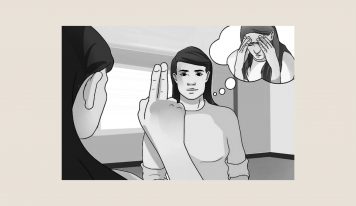PITTSBURGH_Detention guards didn’t know why some incarcerated kids were biting and pinching their own arms and legs, pulling at their ears, and otherwise mutilating themselves. The youths were autistic.
“When we went in, it was just very apparent,” says psychologist Tammy Hughes. “But because (officers) hadn’t had the training, because they didn’t know what autism looked like, it was misunderstood.”
People with autism spectrum disorder [ASD] are seven times more likely than peers to be either crime victims–or suspected or actual perpetrators.
Hughes trains police, judges, lawyers, and guards to recognize and address autism. She reminds people that autism is not synonymous with violence. This article is drawn from those conversations. Her training materials have been presented to over a thousand judges. But work remains.
It starts on the streets, sometimes in surprising ways. Hughes describes a case in Ohio, in which a young male with an affinity for blankets entered a house to check out a neighbor’s blankets.

“In some window there was a blanket over a chair,” she says. “The door was open. He went in and was touching the blankets. Now, the people there were home and it did scare them. Quite seriously. But it was breaking and entering technically, but his motive for breaking and entering is not the same motive as you would see for somebody trying to steal…he didn’t steal anything.”
Yet the act was illegal and Hughes says that it isn’t just law enforcement that needs to be trained, but individuals with autism as well. This person, she says, needed to be able to answer the question, “How do I get my needs met in a way that’s not illegal?”
A single run-in with the police, even as a juvenile, can be enough to disrupt a person’s life. With a criminal record comes social stigma, barriers to housing and employment, and even longterm health problems. And studies show that the criminal justice system–from policing, to the courts, to correctional facilities–isn’t set up to address, consider, or even recognize ASD among youth.
Additionally, children can be charged and convicted as adults in court, depending on the details of the case. Hughes knows of kids as young as 14 who have been tried as adults in Allegheny County. Add immaturity on top of disability, and the outcome can be disturbing.
“My whole job is to keep kids out of jail and in school,” says Tammy Hughes, a Duquesne University professor in the Department of Counseling, Psychology and Special Education. “A lot of the screenings in juvenile justice really only look at psychiatric problems and not at developmental disabilities.”
Take, for example, a routine traffic stop. Loud sirens, flashing lights, and a uniformed officer are frightening for most anyone. For those with ASD, it can feel especially overwhelming.
Similarly, a police pat-down could cause an autistic person to flee or lash out. Suddenly a speeding ticket may escalate to a charge of resisting arrest or assault, all because the individual can’t negotiate the interaction and the police officer lacks the training to recognize autistic behavior.
“They look very criminal when they really are not,” Hughes says.
This miscommunication can also extend into the courtroom, says Hughes. A juvenile offender may appear to a courtroom and judge as angry, aggressive or lacking remorse.
“You can’t punish a child with a disability for a symptom, a trait of their disability” in a school setting, says Hughes, “but there’s no equal partner to that in juvenile justice.”
This article is based on conversations with C.S. Wyatt, host of The Autistic Me podcast, and Amanda Alcorn and Evan Koepfinger, students at Evolve Coaching’s Joey Travolta/Arts for Autism Film Camp. Click below for full audio and transcripts.
- The Autistic Me’s C.S. Wyatt.
- Joey Travolta/Arts for Autism Film Camp Students Amanda Alcorn and Evan Koepfinger (Main).
- Joey Travolta/Arts for Autism Film Camp Student Amanda Alcorn (Added Question).
The All-Abilities Media Project is a collaboration between Unabridged Press and the Center for Media Innovation at Point Park University in downtown Pittsburgh. The author, Brian Conway is a freelance reporter. His environmental reporting was awarded in the Society of Professional Journalists’ Keystone Chapter Spotlight contest. His work has been published in Motherboard, October, and the Chicago Tribune. @BrianConwayyyyy

















